The Best Trucking Software
Whether you run a fleet, brokerage, or owner-operator business, we’ve assessed the top trucking business software to streamline dispatching, automate tracking, and simplify accounting.
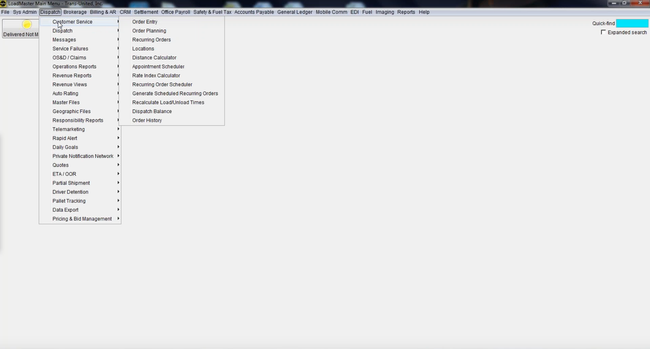
- Offers advanced, real-time GPS tracking
- Includes billing documentation
- Over 100 integrations and 30 modules
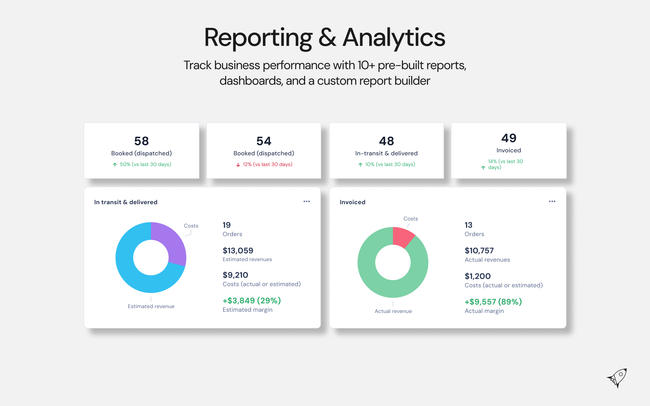
- Driver mobile app, customer and partner portals
- Monitors ETA of in-transit orders live
- Track and trace shipments
- Integrates with Samsara, QuickBooks, etc.
- Responsive support team
- One-click accounting
Trucking software handles transportation management, including dispatch operations, load planning, driver management, billing, and tracking. Using our advanced review methodology, our team has carefully evaluated top trucking software to find the best options for truckload carriers, private fleets, and more.
- McLeod LoadMaster: Best Overall
- Rose Rocket TMS: Best Track and Trace Tools
- Alvys: Best Integration Options
- TruckMaster Envision: Strong Accounting Features
- DAT Broker TMS: Best for 3PLs and Brokers
- ezLoads TMS: Great Mobile App
- EnvioHQ TMS: Best Free Option
McLeod LoadMaster - Best Overall
McLeod LoadMaster delivers a strong dispatch operations management system, accounting features, and office payroll functionalities. You can expand LoadMaster’s capabilities with over 30 modules and more than 100 mature, fully-tested integration products. This extensive range covers other transportation management and trucking industry solutions, from mobile communications to vehicle maintenance management.
Key strengths of LoadMaster include its advanced real-time GPS tracking capabilities and billing documentation, essential for efficient fleet management and operational transparency. It’s designed to cater to trucking sector needs, including dispatch, vehicle fuel and maintenance management, mobile driver communication, and driver safety and efficiency management.
Rose Rocket TMS - Best Track and Trace Tools
With Rose Rocket TMS, you can create custom track and trace boards for certain customers. These boards allow you to securely share shipment data. For example, you can exclude internal data like margins and costs to protect sensitive business information.
Rose Rocket also includes built-in security and access controls, so customers only see their own shipments. As loads move through key stages—order received, in transit, delivered—the boards update in real time. This saves you the back-and-forth of status check calls and emails. Instead of chasing updates, customers receive a live, shareable link to monitor their shipments independently without ever having to log in to Rose Rocket.
This trucking management software starts at $233/month. It’s a solid choice for 3PLs and brokerages, LTL/FTL carriers, freight brokers, and dedicated fleets. However, some user reviews mention a lack of advanced features, like searchable lane histories or a carrier rate database.
Alvys - Best Integration Options
Alyvs offers extensive integration capabilities with industry-leading software. These include Samsara, RMIS, DAT, Motive, RTS, Geotab, QuickBooks, TCS, load boards, and visibility tools. This ensures smooth operations and the convenience of conducting tasks in one place without needing multiple tabs or systems.
Key features of Alvys include a driver mobile app, real-time load tracking and tracing with integrated ELD, and tools for effectively sourcing truck capacity. Additionally, the software offers load management, one-click accounting for easy payment and invoice processing, and integrated analytics and reporting for tracking asset and driver performance.
TruckMaster Envision - Strong Accounting Features
TruckMaster EnVision’s accounting system supports custom ledger and multiple bank accounts. The software also provides a wide range of standard and industry-specific reports for detailed financial analysis, allowing users to make informed decisions.
With seamless data flow from the Dispatching module to Billing, Driver Settlements, Payroll, and Accounting, users can efficiently manage all aspects of their operations. Additionally, the ability to generate tax forms and control changes to closed periods enhances functionality and compliance.
DAT Broker TMS - Best for 3PLs and Brokers
DAT Broker TMS best serves 3PLs and freight brokers with its carrier selection and load matching features. These tools leverage DAT’s extensive network with data on more than 1.3 million trucks, helping users find capacity on demand and cover loads efficiently.
DAT Broker TMS, paired with DAT OnTime, provides visibility into the location and status of all loads, allowing brokers and 3PLs to track shipments from a single screen. This feature supports transparent and automated load-tracking services. Additionally, it has optional modules in the freight matching interface, CRM sales, CarrierWatch interface, and more.
ezLoads TMS - Great Mobile App
ezLoads TMS’s mobile app connects drivers to the TMS for efficient load status updates and submission of scanned Proof of Delivery (POD) or receipts directly into the system. This all-inclusive trucking solution also manages DOT safety compliance requirements and documents for drivers and equipment, ensuring regulatory compliance with expiration date tracking.
With ezLoads, tasks such as preparing driver settlements, invoicing, and generating IFTA reports are streamlined, requiring just a few clicks for completion. This user-friendly and efficient approach enhances productivity and simplifies trucking operations.
EnvioHQ TMS - Best Free Option
EnvioHQ TMS provides a no-cost, freemium plan designed specifically for a single truck, offering a full suite of features without any hidden fees. This plan suits logistics startups and small companies looking to streamline their operations, from managing routes to tracking shipments, without any financial commitment.
The platform is flexible, allowing businesses to upgrade or terminate their plan anytime. Additionally, the freemium service includes access to valuable real-time data, such as cost tracking and distance reporting, helping companies optimize their logistics operations.
What Is Trucking Software?
Trucking software is a digital tool designed to handle route planning, fleet management, load scheduling, and delivery tracking. It provides a unified way to manage dispatch records, pay invoices, and monitor interstate fuel tax agreement (IFTA) reports. Trucking software can be used by single owner/operators, or by a company managing a fleet of drivers or carriers.
The best trucking software can also help your transportation industry business become more profitable by monitoring needed maintenance on your trucks and finding ways to save on fuel costs through accurate mileage reports and expense records. Trucking software doesn’t always include back-office functionalities such as accounting, simply because some developers will focus their efforts on industry-specific features such as fuel tax management and proper route management.
Trucking Software Features
- Routing and Dispatch Management: Coordinate dispatchers and drivers by assigning new orders in real-time to an available agent. Planning tools will help optimize the most efficient route for the driver to take and provide turn-by-turn navigation to reduce the miles driven, lower long-term maintenance costs, and improve customer satisfaction. Can also be referred to as load planning.
- IFTA Services: Create the necessary fuel and mileage reports for your business. Track receipts, manage mileage logs, match fuel to taxes
- Accounting: Process invoices, input receipts, and manage expenses. Store information on vendors/suppliers via accounts payable and track customer data via accounts receivable. Create financial reports in a general ledger such as profit and loss and balance sheets.
- Fleet Maintenance: Establish preventable tasks on a set schedule to ensure vehicles in your fleet are inspected routinely. Create work orders for preventative and predictive maintenance. Keep a record of all repair history on vehicles to better extend the lifecycle in your overall fleet management.
- Fuel Tax Management: Record trip-by-trip fuel permits connected with your IFTA account. Report and pay on fuel taxes owed quarterly. Monitor jurisdictions, track licenses and exemptions, automate data collection, maintain rules/rates/forms, and automate tax filing.
Dispatch Trucking Software
Trucking dispatch software (also known as logistics software for trucking companies) automates the routing and scheduling process for your drivers by monitoring orders, trucks, trailers, and drivers all from one centralized location. The main goal of the dispatching feature in trucking software will be establishing a reliable way to dispatch your staff and ensure your customer’s orders are being fulfilled in a timely fashion.
GPS Tracking
Dispatchers at your primary base of operations will be able to monitor the location of trucks and see which drivers are available. This information is useful to determine if your business is operating on schedule or not. If your trucks are equipped with GPS tracking, or if your truck drivers are using tablets or mobile devices, movements can be tracked and messages can be sent back and forth from the office to the drivers on the road.
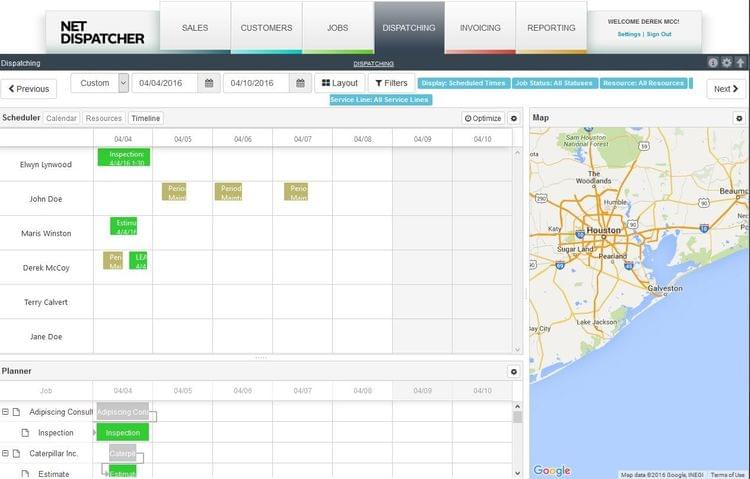
Scheduling
The best dispatching capabilities in trucking software will comfortably merge scheduling with dispatching to make sure your drivers are delivering on time, as well as using their time wisely when it comes to any additional orders that may come about.
Interactive maps will show you where your current and pending orders are at which will let your office determine the most optimal route to take to complete a certain order.
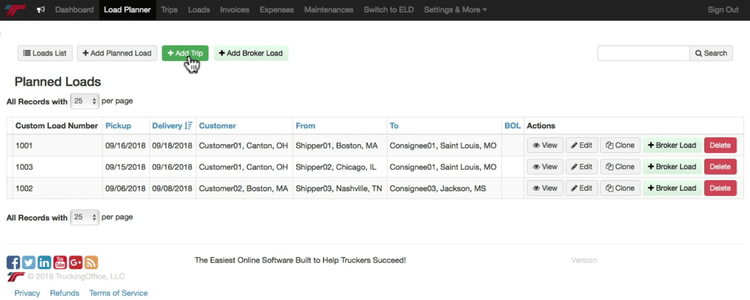
On The Road Access
As mentioned before, mobile apps let truckers receive important messages on the road and lets their location be easily tracked. This location tracking is vital for tracking driver movement and determining if they are following the most ideal route. This data is usually automatically logged into the trucking software which reduces human error during data entry.
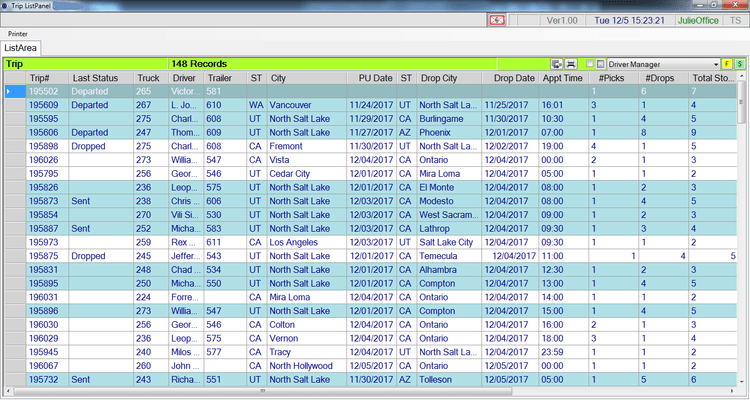
Trucking Software for Owner Operators
Trucking software for owner-operators will tend to be smaller scale solutions at a more affordable price point. This is because owner-operators are any one person who runs their own trucking business.
Owner-operators will either own or lease their own truck carrier and take care of the transportation themselves. Like any sole proprietor, they are on the hook for managing every aspect of their business, from closing deals, working through orders, and managing their finances.
A small fleet business that is only managing one truck will likely have fewer expenses and fewer data to record and thus need more basic trucking software.
Independent owner-operators are in charge of their entire business and can pick and choose the loads and schedules they want to work. However, these independent workers need to make sure they have every legality handled within their trucking software to ensure they operate efficiently, such as:
- Permits
- Licenses
- Tax documents
Independent owner-operators should look for solutions that let them better control their:
- Load planning and dispatches
- Record information on vendors and customers
- Create invoices
- Handle IFTA reporting
Leased operators won’t usually be their own boss, and will operate on contracts for specific trucking companies. These trucking companies will provide the load and dispatches to the driver directly, which can eliminate some of the work needed by the driver. Because of this, the main features they’ll want to look for in any trucking software are:
- Fuel management
- Expense tracking
- Scheduling management
Free Trucking Software
Trucking companies or owner-operators looking for a free solution to manage their business will have a hard time finding anything that was built with truckers in mind. Many truckers may simply try and get by using free programs such as OpenOffice, or programs they may already have access to such as Excel or Google Sheets. However, these programs will require a lot of pre-existing knowledge of spreadsheets if the goal is to make them work like accounting, invoicing, or load management solutions.
TruckBytes provides complete accounting and truck management at no cost to the user. The solution was created as an alternative for manual record keeping for independent users and owner-operators. Primarily the solution tracks loads, manages customers, and creates invoices, among other features. IFTA services are available for $15/truck/month paid annually.
Beyond TruckBytes, you’ll be hard-pressed to find a truly free option. However, many trucking solutions provide free 30-day trials of their software that you can download and experiment with to see if it’s the best fit. There are also plenty of low-cost options on the market, such as Truckn Pro from Fog Line Software, which starts at $79/one-time.
Transportation ERP Software
If your trucking business is large enough, you’ll want to consider a full transportation management software (TMS). Also known as transportation ERP software, a TMS will improve the efficiency of your logistics company through inbound/outbound freight tracking, optimized routes, load building operations, freight auditing, and more.
Once a trucking business gets above a certain size, they will want to consider the added benefits that come with a fully integrated transportation management solution. While there is no industry standard as to when you should consider a more simplistic trucking solution or a more robust transportation software that is fully integrated, there are a few things you can consider:
- How many trucks are in your operations?
- Do you have more advanced methods of transportation, such as via airplane or cargo ship?
- Are you ok with using different software solutions to manage your accounting and dispatching?
- Would you consider your delivery and supply processes to be of a larger scale?
A larger fleet of trucks and a desire for a more complete unified system for complex operations means transportation ERP software could be a better fit.
Is QuickBooks a Trucking Software?
QuickBooks Pro and QuickBooks Online are generic accounting solutions that are intended for use by any industry. There is no trucking-specific version of QuickBooks available. However, many trucking businesses have found success using QuickBooks as their primary accounting software when pairing it with an industry-specific dispatching and route management option.
Many trucking software solutions claim they offer accounting functionality, but in reality, they only provide a basic invoicing feature. If you are looking for a general ledger or even accounts payable and accounts receivable to get better control of your company finances, QuickBooks can be a great fit. However, you’ll have to put up with industry-neutral language, and without proper training on the software, you may be confused knowing how to properly record information pertaining to loads, orders you’ve received, and more.































